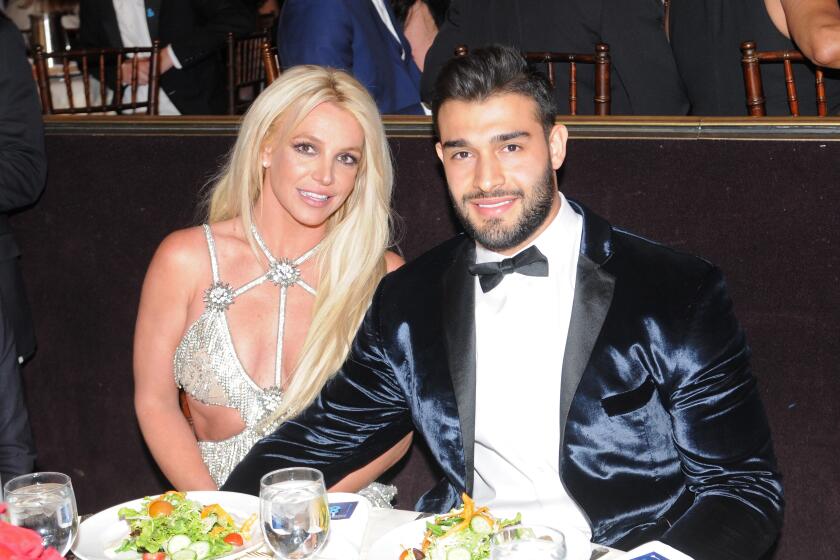Courtney Love and the Flip Side of Criticism : Commentary: Female rock pioneers are reviled for in-your-face rebellion, but men are praised for having the same attribute.
Courtney Love is quoted in the current issue of Vanity Fair magazine as saying, “Rock is about writing your own script; it’s all about pioneering.”
*
While male rock revolutionaries from Jim Morrison to Johnny Rotten were worshiped by fans and critics for their in-your-face rebellion, the 29-year-old leader of Hole is frequently reviled for carrying on in that same spirit.
In Vanity Fair’s cover story, writer Kevin Sessums refers to Love as a “tough little slut,” calls her live performance “vulgar allure in full bloom” and focuses in detail on her sex life. At one point he asks, “Are you a top or a bottom?”
And Sessums’ article is one of the more gushy profiles on Love that has been done.
Still, the story illustrates and contributes to a double standard in rock--one in which strong women are held to more constrictive moral and personal standards than male artists.
Love’s willingness to spill it all in interviews admittedly brings on this kind of personal scrutiny. But the media also can’t resist rising to the bait and taking it a step further, judging her by the same old measures used exclusively for women: Does she have sex appeal? Is her social behavior ladylike? How is she as a mother? And she often faces questions about intimate matters that rarely surface in articles on male performers.
Does anybody ever ask the outspoken Henry Rollins whether he’s a top or a bottom?
Does anyone care?
* After her husband Kurt Cobain’s drug overdose in Rome, the L.A. Weekly wondered how Love had time to apply the red lipstick she was wearing while climbing into the ambulance.
Did anyone report on Eric Clapton’s appearance following the tragic death of his son?
* In response to Hole’s “Doll Parts” video, in which Love displays her grief over Cobain’s death, the Village Voice chastised her: “Someday you will get up off the floor and stop acting out, Girlfriend.”
When Eddie Vedder expressed his grief over Cobain’s death by appearing on “Saturday Night Live” with a letter K on his shirt, the singer’s gesture was widely considered sincere and deep.
* A review of Hole’s “Live Through This” album last year in People magazine speculated: “If Love can keep her demons in check, she has a future.”
Isn’t Trent Reznor of Nine Inch Nails heralded for purging his inner demons?
* Newsweek’s advice in an essay about Love’s flamboyant behavior: Act more like Melissa Etheridge or Sheryl Crow, and maybe you’ll gain some real respect.
I guess that means people will like you better if you smile pretty and sing lyrics like “All I wanna do is have some fun.”
It would be simple enough to ascribe this treatment to age-old sexism, but, in fact, much of this material was written by women who have have inherited longstanding traditions in rock journalism.
Love isn’t the only woman who’s sized up and assessed. Evidence of this double standard can be found in articles on everyone from Liz Phair (who’s noted more for her “lewd” lyrics in a couple of songs than the varied subject matter in dozens of other numbers) to PJ Harvey to Sinead O’Connor (who was lambasted for her political sentiments, which were similar to ones Bob Dylan was heralded for 30 years earlier).
Icelandic singer Bjork has an upcoming solo album that is bound to be hailed as one of the year’s strongest, but when she displayed some eccentric behavior during an interview in the current issue of Details magazine, she is described as going into “erotic elf-mode,” then questioned about her sex life.
The story kicks off with observations about the 29-year-old’s behavior as a mother. Details decides that even though Bjork lets her nanny drink a beer on the job, “the main impression is that of happy domesticity.”
Thanks for the validation, but who asked?
Keith Richards is a father, so is Sonic Youth’s Thurston Moore. Why not focus on their child-rearing practices?
But now that women have proved more adept than their male peers at creating rock with a purpose (PJ to me means Polly Jean, not Pearl Jam), the judgment calls by both media and fans border on archaic.
This treatment is nothing new for women in the media. Actress Frances Farmer paid a heavy price in the 1940s for her rebellious nature--she was exiled from Hollywood and institutionalized. It’s no coincidence that Cobain and Love named their daughter after the late actress.
More to Read
The biggest entertainment stories
Get our big stories about Hollywood, film, television, music, arts, culture and more right in your inbox as soon as they publish.
You may occasionally receive promotional content from the Los Angeles Times.







